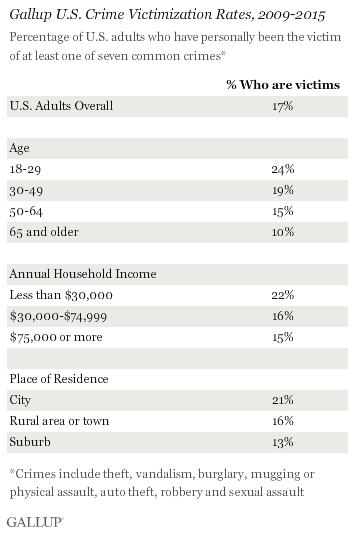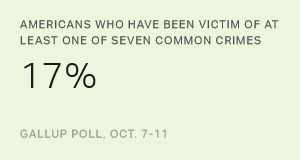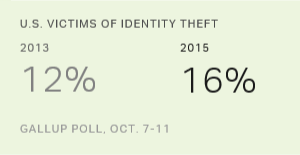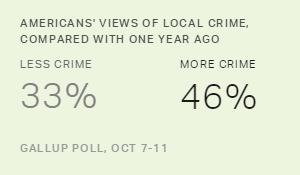Story Highlights
- One in four adults younger than 30 are crime victims
- City dwellers and the poor also frequent crime targets
WASHINGTON, D.C. -- The young, the poor and those who live in cities are among the most likely targets of crime in the U.S., a study of Gallup polls over the past seven years reveals. All three groups are significantly more likely than the national average (17%) to say they personally were victims in the past year of at least one of seven crimes included in Gallup's index.

Gallup asked U.S. adults in six polls conducted from 2009 to 2015 whether they had personally been the victim within the previous year of one of seven conventional crimes: theft, vandalism, burglary, mugging or physical assault, auto theft, robbery and sexual assault. The rates of personal and household victimization have been steady over this time.

Differences in victim rates across various demographic and geographic groups are not large, but age, income and place of residence clearly have an effect:
- The 21% of those describing their place of residence as a "big city" or "small city" who have been crime victims contrasts with 13% of those who say they live in suburbs.
- Those aged 18 to 29 (24%) are more than twice as likely to report being a victim of crime as those aged 65 and older (10%).
- Those at the lowest end of the household income scale are more likely to be victims (22%) than those who earn more.
- Blacks (21%) and Hispanics (21%) are slightly more likely than whites (16%) to report being victims.
- Thirteen percent of those with a postgraduate education have been victims. Those with a postgraduate education tend to have higher incomes and are older, fitting the profile of those with low victimization rates.
- There is virtually no difference by gender: 17% of both men and women report being crime victims.
- Gun owners, at 20%, are slightly more likely than the national average to be crime victims. It is unclear whether owners bought a gun as a result of being a crime victim or whether they were already armed.
Age, Income and Area Interwoven, but Each Matters
Age, income and location of one's residence overlap each other: Cities tend to attract adults younger than 30; young adults earn less on average than those aged 30 and older; cities hold a disproportionate number of those with lower incomes.
But with all three groups, the high victimization rates are not just a function of their close relationship to the other groups. Those younger than 30 are most likely to be crime victims no matter where they live or how much they earn. Those with the lowest household incomes are more likely than other income groups to be victims no matter how old they are or where they live. Much of the same is true for city dwellers.
More broadly, a statistical analysis that takes into account the independent effects of age, income and location of residence suggests age is a slightly more important predictor of whether one is a crime victim than where he or she lives or his or her income level.
Bottom Line
Being poor, young or a city dweller is associated with a higher probability of being a target for criminals, with those younger than 30 especially vulnerable to property crimes such as theft, vandalism and break-ins. For younger millennials transitioning to an independent adulthood, the question is how much their vulnerability to such crimes could be lowered.
Survey Methods
Results for this Gallup poll are based on telephone interviews conducted in six Gallup polls on crime conducted in 2009, 2010, 2011, 2013, 2014 and most recently Oct. 7-11, 2015. The aggregate sample for the five polls contains 7,141 adults, aged 18 and older, living in all 50 U.S. states and the District of Columbia. For results based on the subgroups mentioned, the margin of sampling error is ±5 percentage points or less at the 95% confidence level. All reported margins of sampling error include computed design effects for weighting.
Learn more about how Gallup Poll Social Series works.



